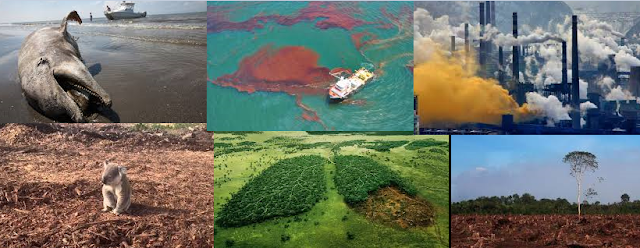Blog #4 Green Collar Crime
We have one earth to live on. We do not seem to take care of it or respect it. Often you may hear about an oil spill or environmental accident that happens and think, "Someone should be held responsible for this." Good news and bad news regarding that. Good news, someone does get held responsible. Bad news, the punishment is not nearly strong enough. This type of crime is called a green collar crime. Green collar crime is any crime that is done against the environment. These crimes include things like: deforestation, air pollution, water pollution, dumping of hazardous waste, and species decline. This is a crime that can be enforced across national borders on a global basis but is usually enforced by local federal governments. Mos often it is done by corporations and they are fined base don negligence when found guilty of their crimes.
One such example is in Bophal India an explosion happened at Union Carbide. It took 25 years but seven officials were sent to prison and the corporation was heavily fined. The video above outlines the crime and what green collar crime is.
In the United States the federal law is responsible for green collar crime. The law uses an intricate system of laws and permits. Companies must have permits to conduct certain businesses and to deal with certain materials. Although it is not always enforced strictly. In California however, state law regulates environmental crime and it is strictly enforced.
One of the worst examples of green collar crime in the United States is the BP oil spill. This spill happened on Tuesday April tenth in 2010. This is the largest oil spill in U.S. history. 3.19 million barrels of oil spilled. The oil spill was precursor by an explosion on an oil-rig off the coast of Louisiana. This spill polluted the gulf and continued to leak for eighty-seven days and killed eleven people. The oil spread to a point where there was a 22 mile long oil plume. It is estimated that as much as twenty percent of the oil found its way to the seafloor damaging sea corals and the unseen ecosystems of the ocean floor. Today, researchers continue to work to understand the impact of this spill on the environment. This effected the marine life and all surrounding inhabitants. BP and five states ended up settling for $18.5 billion in fines and restitution from the clean water act and various claims. Although the full impact is still unknown and it can never be restored to the way it was before. What can be most frustrating is that this fine is mostly tax deductible so, it allows them to write it off as well.
We have one earth to live on. We do not seem to take care of it or respect it. Often you may hear about an oil spill or environmental accident that happens and think, "Someone should be held responsible for this." Good news and bad news regarding that. Good news, someone does get held responsible. Bad news, the punishment is not nearly strong enough. This type of crime is called a green collar crime. Green collar crime is any crime that is done against the environment. These crimes include things like: deforestation, air pollution, water pollution, dumping of hazardous waste, and species decline. This is a crime that can be enforced across national borders on a global basis but is usually enforced by local federal governments. Mos often it is done by corporations and they are fined base don negligence when found guilty of their crimes.
In the United States the federal law is responsible for green collar crime. The law uses an intricate system of laws and permits. Companies must have permits to conduct certain businesses and to deal with certain materials. Although it is not always enforced strictly. In California however, state law regulates environmental crime and it is strictly enforced.
One of the worst examples of green collar crime in the United States is the BP oil spill. This spill happened on Tuesday April tenth in 2010. This is the largest oil spill in U.S. history. 3.19 million barrels of oil spilled. The oil spill was precursor by an explosion on an oil-rig off the coast of Louisiana. This spill polluted the gulf and continued to leak for eighty-seven days and killed eleven people. The oil spread to a point where there was a 22 mile long oil plume. It is estimated that as much as twenty percent of the oil found its way to the seafloor damaging sea corals and the unseen ecosystems of the ocean floor. Today, researchers continue to work to understand the impact of this spill on the environment. This effected the marine life and all surrounding inhabitants. BP and five states ended up settling for $18.5 billion in fines and restitution from the clean water act and various claims. Although the full impact is still unknown and it can never be restored to the way it was before. What can be most frustrating is that this fine is mostly tax deductible so, it allows them to write it off as well.
Works Cited
Brennan, Linda Crotta. The Gulf Oil Spill. Minneapolis, MN: ABDO Pub., 2013. Print.
"Environmental Crimes." History Learning Site. Learning History, n.d. Web. 15 May 2017.
Kennedy, Charles. "Most Of BP's $20.8 Billion Deepwater Horizon Fine Is Tax Deductible." OilPrice.com. N.p., 07 Oct. 2015. Web. 15 May 2017.
O'hear, Michael M. "Sentencing the Green Collar Offender." HeinOnline. HEIN Online, n.d. Web. 15 May 2017.

No comments:
Post a Comment